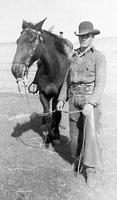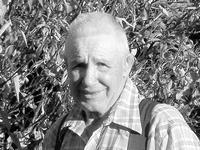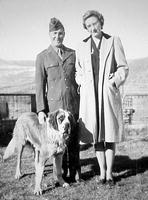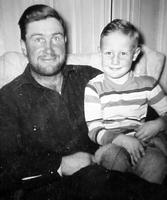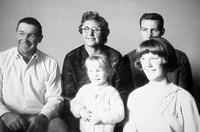|
The Sublette County Journal Volume 4, Number 7 - 10/14/99 brought to you online by Pinedale Online
Max is one of the last of the Old West Cowboys. by Cris Paravicini He's one of last of the Old West cowboys - a rare breed of men, whose passion for his horse, his cowdog, and a cow, flickers like the last light of a Sublette County sunset. In what is now called the ranch romance era of weekend and wanna-be cowboys, Max Orgill made his living and raised a fine family while working on the old-time cattle range. The cowboy lifestyle burns within Max; he sought no other way. Born the eldest son (three brothers and one sister) of Alexander and Margaret Walker Orgill in the farming country of Egin, Idaho, on February 22, 1920, the family moved to Kemmerer, Wyoming when Max was only four years old. There, his father played the violin as musical background for silent movie scores; he worked for the railroad; and also operated the local movie theater, which the Orgill brothers helped to clean each day. As a four-year old, Max's father taught him to play the classical violin. Max's siblings also played musical instruments and together a marvelous family band was formed. Over the years, the Orgill troupe played for many dances in Utah, Idaho, and Wyoming. In 1940, after Max completed his high school education in Kemmerer, he migrated north to the Polson cow camp in the Fontenelle country. The eighteen-year old and his family had made regular summer visits to the area, and Max sensed that the cowboy lifestyle was calling him. Max - whose attentive eyes are sincere and his deep, storyteller's voice is soft-spoken - says that his family's roots with livestock run strong. His grandfather had trailed and grazed a band of sheep from Driggs, Idaho south to Utah; east to Lone Tree in the Bridger Valley - the land of the famed Hole-in-the-Wall Gang; north to the tail end of the Wind River Mountains, returning then to Idaho.
During high school, Dorothy and Max regularly attended school dances together. Dorothy laughed, remembering one such special night. "Back then, you would go with a date to a dance, but once there, you'd dance with everyone. Max didn't really like to dance, so when he came up missing one night, I didn't think much about it. I just danced and had a good time. Then, when it was time for him to take me home - no Max!" Dorothy grinned and continued. "As it turns out, Max and one of his friends had sneaked away from the dance to check their coyote traps on the outskirts of Kemmerer." Max worked for the south-county cattle ranches until 1944, when at 22 years old he was inducted into the Army during World War II. Seventeen months later during the US invasion of Okinawa, shrapnel from sniper-fire, which he still carries in one leg, seriously wounded Max. He spent the next five months recuperating in hospitals from Guam to Hawaii to Modesto, California. A difficult part of his injury, Max says, was that after being wounded and still pinned down by gunfire, his duffel bag, carrying Dorothy's grandfather's old Elgin pocket watch, lie nearby, just out of his reach. Because of the accuracy of the old watch, Max said all the time pieces in his unit had been synchronized with this Elgin. Max tried every way he could to retrieve the bag, but in the end, the watch was left behind. After receiving an honorable discharge from military service, Max returned to his wife and family in Sublette County and began working for the Green River Valley cattlemen, taking care of cows from the Mesa to the Upper Green River. Max worked with the head association rider, Rex Wardell, a man whom Max says he greatly admired and respected. "Rex got along with everyone," Max said, as he ran his thumbs under his suspenders and told how he'd appreciated the seasons he'd spent riding with him. Rex made both men and cowboys of many, carefree young boys. Max chuckled as he talked about the olden days, riding and working alongside some real characters. There were men who roped and wrestled bear cubs and staked down bedrolls and shot .22 holes in bundles of clothing; and tough men he'd fed elk with, and outwitted cranky bull moose that regularly kept them cornered in either their secluded mountain cabin or the barn.
Max also told of hair-raising encounters with moose. "One time, I was snowshoeing in the Little Sheep Mountain area," Max said, "counting elk that hadn't yet made it to the feedground. I was heading back to the cabin, when a moose started after me. Boy, did I climb a tree fast, snowshoes and all! I'd have never made it out of there, if it hadn't been for my dog. The dog would take after the moose for a while; then the moose would chase the dog. About dusk, the moose gave up and took off. Later, as I was hurrying down the hillside, pushing little jack pines out of the way with my arms, my hand fell across the face of a moose lying in the snow beside a tree. My heart just fell and I thought this is it. But she didn't even move! I backed up real slow, one step at a time, which is pretty hard to do in snowshoes. With each step back, I expected her to jump up, or at least move, but she didn't. I thought she was dead or something. But after I had backed off quite a ways, she shook her head, but never got up, so I took off in a heck of a hurry." Another confrontation happened one fall on Rock Creek, when Max was pushing cows out of a high-country willow patch filled with bogs and beaver dams. He was riding down a narrow path on a little black mare named Cricket, when a moose suddenly stuck its head out of the willows and thundered after him. It scared the mare and she ran full out down through the thicket, hitting bogs and flailing through beaver ponds. Like a scene from Ichabod Crane and the Headless Horseman, the mad moose clattered after the helpless horse and rider. The chase continued until the moose finally broke away and headed back up the hill. Thereafter, Max says, he gained a greater respect and love for his nimble mare. While riding along a narrow trail high above Rock Creek, Max met yet another cranky bull moose. He says he'd decided to outlast the moose, hoping it would quit the trail first. However, the gelding he was riding had other ideas, and shied and swapped ends so fast he ran through his own tail. But by then, the big bull was deathly close and hooked the horse in the rump, shoving him and Max over the edge of the trail, thrusting them headlong toward the rocky streambed far below. "All that saved me," Max said, "was that I was able to grab onto some brush that was sticking out of the hillside. I looked up and saw the beggar looking down at us; then it took off. The horse was okay, except for scrapes, but there wasn't much left of my saddle. I led the horse back onto the trail and walked the rest of the way back to camp." While working for the cattle association, Max recalled only one time that a grizzly bear, which Snooks Moore tried unsuccessfully to trap, had ever harassed the cattle. However, one particular black bear did become quite a pest. Each night he would come to the cabin to chew on a quarter of beef that the cowboys had hung on the porch for camp meat. One night when the commotion began, Max stepped out the door and shot into the night. He was sure he'd hit the bear, but to what degree, he could only guess. Next morning, Max and fellow cowboy warily set out to look for it. A short distance from the cabin, they discovered the bear lying in the creek, dead.
Jeanene also recalled that in the early springtime she, her dad, and her brother Rex were usually the first horseback riders into the mountains, breaking through snowdrifts on the forest trails. "My dad knew the movements of the elk herds so well that on any given day he could tell you exactly where they were grazing." Over the years, the Orgill family camped beneath the stars, lived in cow camps and on ranches, and had a home near Cora. In 1957, the family moved permanently to their present home in Pinedale. Max hayed and fed cows for ranchers like Barlows, Frank Ball, Carroll Noble, Dave Johnson, the Polsons, Pat Dew, and Daisy Hicks. Max also cowboyed on one of the last cow drives to the railhead in Opal, Wyoming, where ranchers loaded their beef on cow trains bound for market in Omaha, Nebraska. In the 1970s Max hung up his spurs, and for a while, worked for Sulenta Construction in Pinedale. In Max's line of work, accidents became the norm. In March 1953, a saddle horse fell on him and broke his leg at the Hicks' ranch in Bondurant. He was able to crawl back onto his horse and ride to their lower ranch. "If it wasn't for Bob McNeel," Max says, "I would have been in deep trouble. He saved the day and helped Dorothy get me to the hospital in Jackson." Another cold winter day, Max bunged up his knee while untangling his feed team when they fell on the ice and couldn't regain their footing. In August 1980, he underwent skull surgery after a firewood tree fell on him. The following March, he reentered the hospital to have a plate inserted in his head. In the fall of `85, while backriding for cattle on Roaring Fork, Max said he pushed his horse too fast through the rugged creek bottom and took one heck of a spill, resulting in a dislocated shoulder. Most recently, while haying for Bob Beard in 1990, one of the workhorses rubbed his head under a check, leaving Max with no control of the lines. The team ran off, and Max was bucked from rake seat and slammed beneath the chattering teeth. Luckily, the rake tripped and dumped him out the back end. This accident sidelined Max for the rest of that hay season. Despite the risks, Max says he still prefers doing his work with horses rather than power machinery. "A team will always start, no matter how cold the weather is. You can feed the cows by yourself and if you have to, you can take your gloves off and warm your hands on the horses' butts."
The last close call was in 1962, while he was cowboying on Boulder Creek with Red Mathisen. A storm was fast approaching, so the two men kicked their horses into a lope and headed across McDowell Flat toward the protection of the timber. But Max never made it to the trees. As the hailstorm turned the ground white, a fiery lightning bolt struck hard, knocking Max and horse Nummy to the ground. Though Red was riding right beside Max, he was left untouched and went to get help. The rescue crew observed later that Max, in his semi-conscious state, had dragged himself through the hail and caught his horse. They gathered him up and hauled him back to his home in Pinedale, where he spent the next five days in bed. "The lightning has affected my equilibrium, and now I have trouble when I climb up on a high place, like digging hay on top a stack. Sometimes I have to sit down for a few minutes." Interestingly, Max says Nummy had always been hard to catch and was goosey and unpredictable, but after being struck down, he became a changed horse. "The lightning totally changed his personality, and the rascal became a better horse all the way around," Max said, grinning and slapping his knee with his big, bear paw hand. Max and Dorothy are devout members of Pinedale's LDS Church. They enjoy their family and eight grandkids, and Max still helps out at some of the area ranches. The Orgills own property and a little "bunkhouse" on Pole Creek, where Max and his purty-eyed cowdog Bups go each day to feed the "caretaker" cat and ride his daughter's saddle horse. And once in a while, Max can be talked into playing a classical tune on his violin - as is this cowboy's way. See The Archives for past articles. Copyright © 1999 The Sublette County Journal All rights reserved. Reproduction by any means must have permission of the Publisher. The Sublette County Journal, PO Box 3010, Pinedale, WY 82941 Phone 307-367-3713 Publisher/Editor: Rob Shaul editor@scjonline.com |
